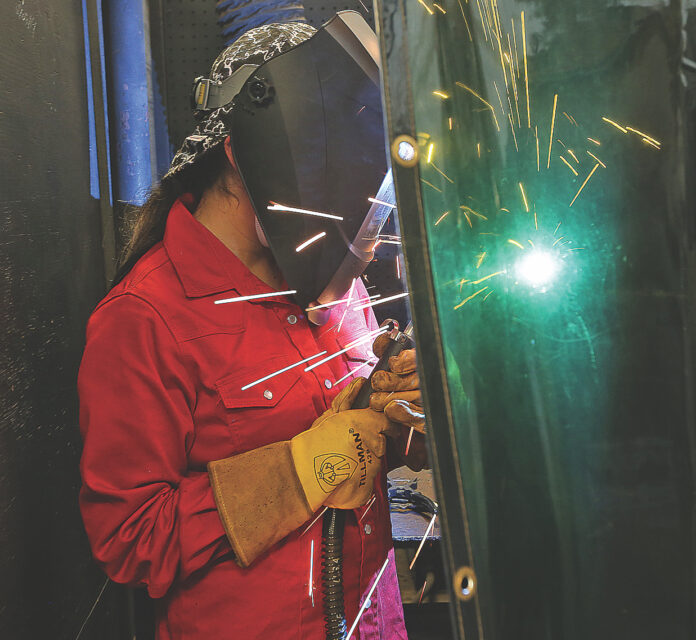McALLEN — In-person class is back in session for some students at South Texas College and will be throughout the summer.
STC announced Tuesday that some classes were beginning to gradually resume on campus with new anti-coronavirus measures in place and would continue through the summer sessions, which begin June 1.
Police and fire academies, welding courses and Nursing and Allied Health courses are all expected to operate on campus when necessary.
“We value our staff and students at South Texas College, so necessary protocols have been implemented to ensure we can continue with our educational learning without compromising anyone’s safety,” Sara Lozano with STC’s Division of Business, Public Safety, and Technology wrote in a statement. “Limited labs are open to students by appointment only, depending on the class they are taking and the number of hours necessary to complete the hands-on component of the course requirement.”

Jose Garza, a welding instructor at the college, resumed in-person classes earlier this month. Class is voluntary, but most of his students are opting to attend.
“We’re adapting very well, and the students are motivated to come in despite the situation, and that’s something that we’re proud of,” he said.
Garza said in-person learning is essential for his students. He estimates 30% of the learning for his welding course is lecture-based and 70% is based on in-person instruction.
“We can teach the lecture part, but we cannot teach hands on,” he said. “There’s a lot of key terms, a lot of knowledge that a welder has to know, but that knowledge doesn’t necessarily make him a good welder. Hands on is a must.”
Lecture instruction is important as well, Garza says, and just meeting for hands-on learning means students sometimes struggle on the theoretical front.
“It’s taken away the lecture from our classroom. That’s where we do a lot of our baby steps, we introduce what we’re going to be doing in the shop. Going straight to the shop,” he said. “They’re having to try it on their own before they really, fully have a good comprehension of it.”
That problem is compounded by the fact that many of Garza’s students don’t have reliable internet, enough that he frequently alternates between texting and emailing students to ensure he’s still in communication with them.
Fortunately, Garza says, most of his students have already welded and so far they’ve been able to keep up.

Students and instructors are simultaneously responsible for adhering to a bevy of new hygienic requirements prompted by the pandemic, including frequently disinfecting classrooms, running a fan to circulate air, wearing masks and frequent handwashing.
“If they show up on campus without a face mask, they cannot even step foot inside the shop. We advise them to go home or provide a facemask, and we haven’t had any issues with that at all, everyone has been fairly well informed and cooperative,” Garza said.
The most difficult of the new requirements involves limits on Garza’s class sizes. Usually, a welding course would number between 12 and 14. Now shops at the college have a limit of nine or 10 people, causing Garza to rotate them through on a first come, first served basis.
“Our smallest shop is eight students plus an instructor, which is nine. The other ones are nine students and one instructor, which is 10. So no more than 10 personnel inside the shop at a time,” he said.
Karina Salinas, a welding student at the college, said the lab portion of her class is basically identical to how it was before the pandemic.
“It doesn’t change many ways, because we go to the lab and it’s just the same thing as usual,” she said.
On the other hand, Salinas said there were fewer opportunities to get that instruction because of scheduling conflicts. She also said she’d rather learn the theoretical portions of the course in-person.
“We have to learn through the computer, and not in front of the professor.” she said. “I think I’m more of a visual learner, and it’s all online now. It’s different.”
Despite the complaint, Salinas is currently one of a select few students in the Rio Grande Valley who has the option to perform any sort of schoolwork on campus. Garza, the welding instructor, says he expects students to continue to adapt and for the schedule to line up with the new class limits more smoothly by summertime.
“It’s just going to be a little bit more refined,” he said. “The schedule was kind of a little hectic at the beginning, but once we come into the summer it’s going to be a lot more refined, a lot more structured.”





